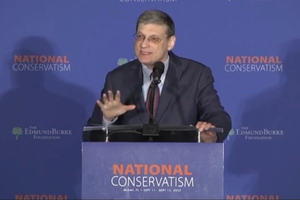The Roots of Polarization: Politics Without Morality and the Transcendent End
COMMENTARY: There is something increasingly bitter about political divisions in our own day.

The shooting in Alexandria, Virginia, earlier this week has provoked another wave of concern over political polarization in the United States.
The theme is now a familiar one: It used to be that people who disagreed, even intensely, about politics could still be friends; certainly they didn’t hate one another. Members of Congress once ended days of partisan wrangling over bourbon and maybe even deal-making. Now members end the day by retiring to the green rooms of their respective favorite cable networks to continue their rancor into the night, and when they return to their districts, they face insults from constituents who didn’t vote for them and, now, even the threat of violence.
Under such circumstances, compromise, much less actual fellowship, are increasingly rare, and the polarization process feeds on itself and intensifies. How did this happen?
While the familiar narrative tends to underplay just how nasty political differences have been at other moments in U.S. history (see, for example: the Sumner-Brooks Affair), there is something increasingly bitter about political divisions in our own day, and some politicians and journalists can remember when it wasn’t so bad.
There are two aspects of this that seem particularly salient, and I think they are related. One concerns the kinds of political issues we now debate. We often hear it said of some question that it is one over which “good people can disagree.” But this indicates the possibility of disagreements of a kind that suggest one’s opponent is not really good. It is one thing to disagree about marginal tax rates, agricultural price supports, or the size of the Navy; it is something else to disagree over abortion, same-sex “marriage” or religious freedom.
Our country is divided over just such issues. While debate about even these issues is often accompanied by a kind of formal affirmation that the other side is comprised of good people, it is likely that just below the surface there is on both sides a sense that this isn’t quite true, that failure to see the rightness of one’s own side indicates some kind of character flaw in the other. “Baby-killers” cannot really be “good people,” nor can “bigots.”
It is usually regarded as one of the signal achievements of modern liberal democracy to have decisively solved one great political problem by embracing and constitutionalizing religious toleration in the wake of the religious wars of the 16th and 17th centuries.
The “Peace of Westphalia” recognized the right of each country to determine its own religious policy, and the later reforms championed by political philosophers like John Locke and Benjamin Constant aimed to take religious division out of politics altogether by separating church and state, or at least guaranteeing freedom of religious belief and practice, a principle endorsed by the Second Vatican Council in its own declaration on religious freedom, Dignitatis Humanae.
Of course, the Council’s aim was not to secularize politics, but to protect the integrity of faith and worship. But even popes have recognized some truth in the Tocquevillian thesis that separating church and state was in practice as good for the former as it was for the latter, and Tocqueville’s own proof for this was the United States of America.
The kind of anti-clerical furor that wracked Europe was unheard of in America, and this demonstrated that there was no natural enmity between democracy and religion. The separation of church and state mandated by the First Amendment allowed Christianity to inform the morals of the vast majority of the people, who were consequently free to disagree about politics. This worked in part because, while the many different religious sects in the U.S. disagreed (peacefully) about religious doctrine, they largely agreed about morality.
There were notable exceptions here — most tragically, the disagreement over slavery that tore the country apart. But, of course, slavery was a question of the deepest moral import, and it came to be admitted by most people that it was a question over which good people could not disagree.
That our deepest political disagreements today are disagreements about moral questions colors even those disagreements over more prosaic political issues, because those on one side of cognate moral disputes tend to align with one another on other issues, which are then often invested with moral significance by a kind of co-naturality, and, increasingly, all political disagreement takes on greater significance.
In and of itself, this is not so strange, since political deliberation is a kind of practical reason; it is not simply the technical or productive reason. All practical reasoning takes place against a backdrop of moral principle, but what we face is an occlusion of any common agreement on that very backdrop.
That this has occurred at a time when “identity politics” is increasingly prevalent only deepens the divisions. There is no compromising one’s “identity,” and it is inherently divisive.
Here we arrive at the second aspect of the problem I want to consider.
The tradition of Catholic social teaching holds that the goal of politics is the “common good,” a notion that is not restricted to the Catholic tradition, but often names a deep aspiration of our politics. Can we really set out to identify and order our political deliberation toward a common good if we do not recognize a common morality?
The idea of the common good is increasingly invoked by religious leaders, including our own bishops, but how this idea can contribute to real solutions to our problems is often murky.
To call for the reaffirmation of the common good implies that someone is opposed to it, but who? Does any politician ever campaign on the platform, “Elect me and I will benefit myself and my friends at your expense” even if that is precisely what he intends?
It is far more likely that political disagreements are disagreements about how to conceive of and promote the common good. Such disagreements can be those over the prosaic matters of taxes, budgets and regulations, and these things are certainly not without moral significance.
At the same time, they are distinct from the backdrop of those deeper moral principles that once informed political deliberation largely below the surface for most of our national history and are now the very subject of political disagreement.
But there is also something important about the idea of the common good itself. While we can think of a variety of very concrete goods like the rule of law, national security, the protection of basic human rights, and the economic market as aspects of the common good of a political society, there is still a higher aspect of the common good.
In the thought of St. Thomas Aquinas, to say that a good is common is to emphasize that it is a shared good, one communicable to many, even all, persons. The “temporal” common good of a political community is one shared by all the citizens, but there is also a transcendent common good, the good common to all persons, because it completes them, and this is God.
The common good is in this sense analogical: The common good of the community fulfills and completes the citizens by providing them the context and even certain concrete goods that are required for them to flourish as human persons. Still, no political community can completely fulfill and perfect us. Only God can do that.
So the temporal common good is itself ordered to and must be open to the ultimate common good that is God.
The centrality of religious freedom in any scheme of basic human rights is a recognition of this fundamental truth. But it is just here that we encounter our problem.
When the political community is closed to the transcendent common good either by some kind of totalitarian denial of religious freedom, such as exists in Marxist regimes, or simply by the widespread forgetting of the transcendent common good, politics takes on a kind of unnatural and self-destructive ultimacy. All political disagreements become absolute, and the temporal common good itself becomes increasingly brittle.
The calls to temper our political disagreements and think more about the common good run aground on the reality that the temporal common good is linked to recognition of the transcendent common good and to the moral life that is ordered to that good.
If we live as if this world and its goods, even those goods that can be shared and that connect us to one another, are all there is, then the stakes in our political disagreements become such as to lead more and more to enmity and division.
For much of our national history, our religious differences, important as they are, co-existed with a widespread agreement that there was a transcendent good beyond the goods of this world, including the good of the political community and about the kind of life that was constitutive of temporal happiness and of our ultimate end. This acceptance of a transcendent good made civil political disagreement possible, and its loss has led to a moralization and, consequently, to an absolutization of politics.
When accompanied by a loss of the knowledge that our political good points beyond itself and is ordered by a good that transcends the political, such moralization and absolutization produces just the sort of polarization we experience today.
Our own history, as well as recent events, teach us just how bad this can get.
V. Bradley Lewis is an associate professor in the School of Philosophy
at The Catholic University of America and a fellow at the Institute for Human Ecology.
- Keywords:
- common good
- political discourse
- political polarization
- politics
- transcendent common good
- v. bradley lewis














